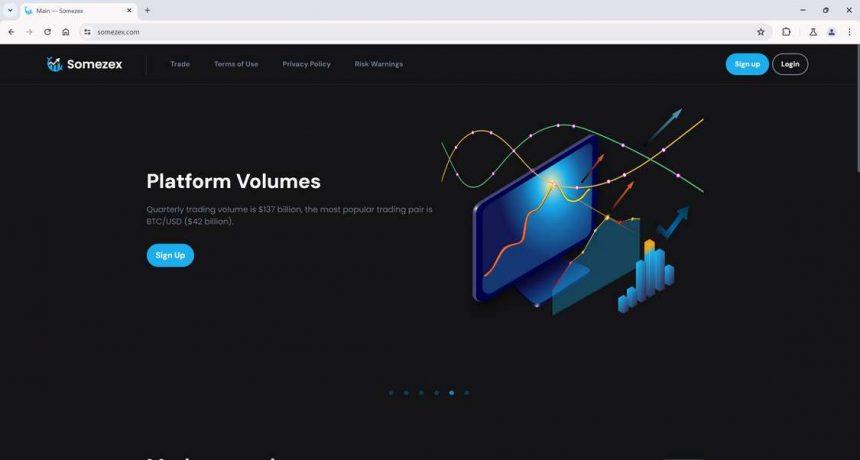In the ever-evolving landscape of cyber threats, the Somezex Trojan has emerged as a potent adversary, leveraging deceptive tactics within the cryptocurrency realm. This malware, cloaked under the guise of a crypto trading platform, orchestrates a sophisticated scam that preys on unsuspecting victims, leaving them entangled in a web of financial deception. From impersonating celebrities to exploiting the allure of free Bitcoin, the Somezex Trojan employs a multi-faceted approach, making it imperative for users to be vigilant and well-informed.
Understanding Somezex and Its Deceptive Tactics
The Crypto Scam Network
Somezex is not an isolated threat but a part of an interconnected web of crypto scam websites. Operating under different names like Nowzex and Spatlex, these fraudulent platforms share not only similar website designs but also replicate deceptive tactics. This uniformity serves as a red flag, signaling that these platforms are woven into the same fraudulent tapestry, all aimed at ensnaring deposits and trust.
The Elon Musk Deception
One of the insidious schemes perpetrated by Somezex involves a false affiliation with Elon Musk. Presenting itself as a crypto trading platform, the scam lures victims with promises of significant incentives and deals. Key hallmarks of this subterfuge include the absence of clear corporate details, a misleading Elon Musk affiliation, a recommendation system relying on tiered referrals, and imposing limits on accessing funds, essentially trapping users’ assets within the platform.
The Bitcoin Promo Code Scam
The modus operandi of Somezex involves the creation of deepfake videos featuring celebrities like Cristiano Ronaldo, Elon Musk, Bill Gates, Mark Zuckerberg, or Drake endorsing a Bitcoin giveaway. Through paid ads and hashtag campaigns, these fake videos are distributed on social platforms, directing viewers to the Somezex.com website. The scam then instructs users to use a specified promo code, promising free Bitcoin. However, this sets off a chain of events where victims unknowingly deposit real crypto into the scam site, leading to the theft of their funds.
Unraveling the Complex Web of Deceit
Ever-Changing Domains
An alarming aspect of the Somezex deception is its adaptability. Even as authorities shut down domains like Somezex.com, the fraudsters seamlessly shift to new domains, maintaining the same criminal operation. From Bitsowex.com to Tokenely.com, the scam persists, relying on lookalike names and branding to confuse and deceive investors. The consistent thread of fake celebrity endorsements, deceptive promo codes, and deposit traps remains unchanged.
Red Flags and Indicators of the Somezex Scam
Recognizing the warning signs is crucial in thwarting the Somezex Trojan and its deceptive tactics. Some red flags include the absence of verifiable company details, unvalidated celebrity endorsements, upfront bitcoin deposits for account activation, recent domain registrations, and offers that seem too good to be true. Users must exercise caution and skepticism, particularly when encountering deals that appear overly advantageous.
Protecting Against Somezex and Similar Threats
Detection Names
The Somezex Trojan falls into the category of Trojan malware. Detection names may vary among security software, but users should look out for indications related to Trojan infections. Common detection names for Somezex may include variations like Trojan.Somezex, Trojan.CryptoDeceit, or similar identifiers.
Removal Guide
- Isolate Infected Devices: Disconnect the infected device from the network to prevent further spread.
- Identify Malicious Processes: Use Task Manager (Ctrl+Shift+Esc) to identify and end any suspicious processes related to Somezex.
- Delete Temporary Files: Clear temporary files using the Disk Cleanup tool to remove any traces of the malware.
- Run a Full Antivirus Scan: Use a reputable antivirus or anti-malware tool to perform a thorough scan and remove the Somezex Trojan.
- Update Operating System and Software: Ensure that your operating system and all installed software are up-to-date with the latest security patches.
Best Practices for Prevention
- Educate Yourself: Stay informed about the latest cyber threats, scams, and deceptive tactics employed by malware like Somezex.
- Verify Authenticity: Before engaging with cryptocurrency platforms or promotional offers, verify the authenticity of the service. Look for clear corporate details, licensing information, and user reviews.
- Exercise Caution on Social Media: Be skeptical of unsolicited promotional content, especially those claiming celebrity endorsements and lucrative giveaways.
- Use Strong, Unique Passwords: Strengthen your online security by using strong, unique passwords for each account, and enable two-factor authentication where possible.
- Regularly Update Security Software: Keep your antivirus and anti-malware software updated to ensure optimal protection against emerging threats.
In conclusion, the Somezex Trojan underscores the need for users to remain vigilant and adopt proactive measures to protect themselves from evolving cyber threats. By staying informed, verifying the authenticity of online services, and implementing best practices for cybersecurity, users can fortify their defenses against scams like Somezex and contribute to disrupting the ecosystem enabling repeat offenders.





